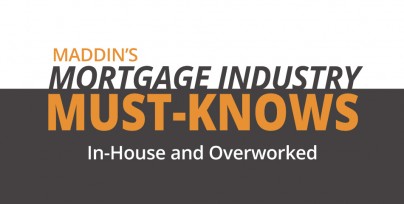In-House and Overworked? The Value of Overflow Counsel
March 21, 2019

Contact(s)
Martin S. Frenkel
Shareholder
Tel: 248.827.1891
Email
The current economic cycle for the mortgage industry can best be described as “betwixt and between:” we have the unusual combination of declining originations and a low level of default servicing work given that mortgage delinquencies are also at historic lows. Juxtapose these circumstances with the broader in-house/outside counsel cycles which play out over many years. At times, companies find it more economical to draw greater amounts of legal talent in house, while at others, they desire to “run lean” from an internal legal staffing perspective. Albeit, the question is rhetorical, the combined factors noted above beg the question, “where does your company find itself in this cycle?”
Unfortunately, regardless of the answer, the demands on in-house counsel rarely seem to decline. However, if your company finds itself in the “belt tightening” part of the cycle, how can you as in-house counsel still continue to meet the demands of the business? The answer may be “overflow” counsel.
Generically, any lawyer not employed by the company, is “outside counsel.” Yet, there is a distinction between “outside counsel” and “overflow counsel” – with the latter being a subset of the former. Overflow counsel can best be described as a firm which is devoted to a long-term relationship with your company, handles work on an ongoing basis whether the work in a given month is a trickle or a waterfall, does not simply appear during a given economic cycle only to disappear when that cycle passes, and tends to do broad spectrum work for the company whether within a large niche or across multiple legal needs or disciplines. Simply put, the firm and company are more deeply linked without regard to the “weather” on any given day.
Finding and vetting overflow counsel can be a difficult process, but the following appear to be core characteristics of good overflow counsel:
- Their relationship with the company is ongoing, rather than episodic
- They are consistently reliable
- They dedicate themselves to learning your business, your goals, and your way of doing things
- They offer you consistency in handling similar matters as well as disparate matters because they understand your business, rather than simply the “industry”
- They are economical in price so that you are not dis-incentivized from using them – what good is a tool if you can’t afford to use it?
- Their familiarity with you and your company allows them to lower transaction costs and work efficiently
- They become a true trusted partner, rather than a mere vendor, allocating (or building if necessary) internal resources to service your company’s ongoing needs
Having good overflow counsel on your bench can help you navigate any economic cycle in which you find yourself and allow you to be prepared to handle whatever comes your way.
 By Martin S. Frenkel, Esq.
By Martin S. Frenkel, Esq.
(248) 827-1891 direct | mfrenkel@maddinhauser.com
Maddin, Hauser, Roth & Heller, P.C.
28400 Northwestern Highway, Second Floor Essex Centre
Southfield, Michigan 48034-1839 | 248 354 4030 phone
Visit Firm Website | Visit Firm Law Firm Alliance profile
This article is for general information only and should not be used as a basis for specific action without obtaining further legal advice.


